THE best lasagna I have ever put in my mouth was in Tuscany. I was traveling there with my family, and we spent the day at a winery (Torciano Tenuto). We had a wine tasting that was spectacular in a private wine cellar. The tasting paired the winery’s various wines with some unbelievable food including: Grandma’s Lasagna. They served a small square of lasagna and drizzled their Truffle oil (just a tad) on top. It was decadent, rich and delicious.
This lasagna is as close as I’ve found to the one we enjoyed in Italy. Note: there is no ricotta or mozzarella! The richness comes from a béchamel sauce and parmesan. The dish takes awhile to prepare, but it is so so worth it. Your friends and family will adore you! Serve with a salad and a great red wine and you’ve got yourself an incredible experience.
Tuscan Lasagna

(Adapted from Smitten Kitchen)
Bolognese sauce
1 medium onion, coarsely chopped (1-inch pieces are fine)
1 large or 2 slim carrots, coarsely chopped
2 ribs celery, coarsely chopped
3 cloves garlic, coarsely chopped
2 to 3 TBSP extra virgin olive oil
Kosher salt
Freshly ground black pepper
1 lb ground chuck, brisket or round or combination 1 lb ground pork
1 1/4 cups tomato paste (from 2 6-ounce cans)
2 cups red wine, preferably hearty but really, anything you like to drink
Water as needed
2 bay leaves
1 tsp dried thyme
Pasta (or you can cheat and buy Whole Foods’ amazing FRESH pasta like I did)
1 1/2 cups all-purpose flour
2 large eggs
1/2 teaspoon table salt
1 to 2 tablespoons water, if needed
Béchamel sauce
1/2 cup (8 TBSP) unsalted butter
1/2 cup flour
4 cups whole milk
1 tsp salt
1 clove minced garlic
1/2 tsp ground nutmeg
Freshly ground black pepper
To assemble
1 2/3 cups grated Parmesan cheese
Day 1: Make the BOLOGNESE: In a food processor, pulse onion, carrots, celery, and garlic until finely chopped.
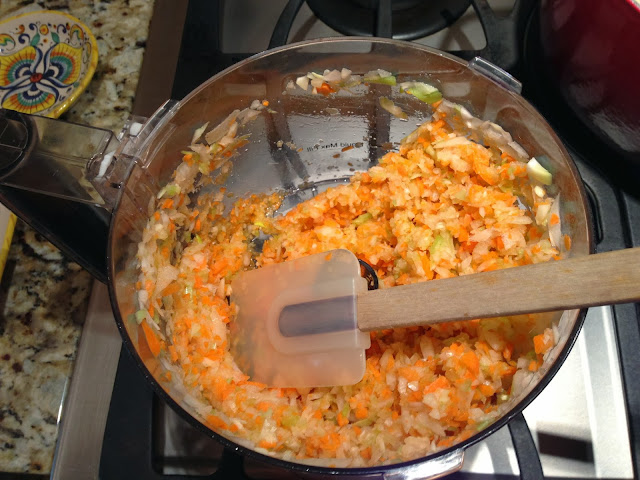
Heat a moderate-sized Dutch oven (4 to 5 quarts) over medium-high heat. Once hot, coat the bottom of the pan with two to three tablespoons of oil. Once it is hot, add the chopped vegetables and season them generously with salt and pepper.
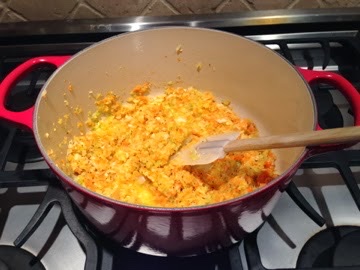
Cook the vegetables until they are evenly brown, stirring frequently, about 15 minutes. Don’t shorten the cooking times, as this creates the big flavors.
Add the ground beef and seasoning again with salt and pepper.
Brown the beef well and again, don’t rush this step. Cook for another 15 minutes.
Add the tomato paste and cook for 3 to 4 minutes.
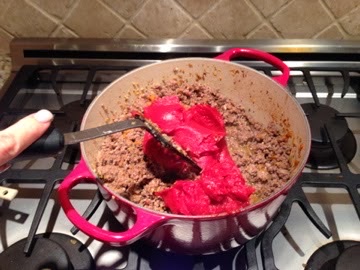
Add the red wine, using it to scrape up any cooked bits in the pan. Cook the wine until it has reduced by half, about 5 more minutes.
Add water to the pan until the water is about 1 inch above the meat. Toss in the bay leaves and thyme and stir to combine, bringing it to a low simmer.
Then, for the next 3 to 4 hours: You’ll keep water near the stove. You’ll stir the sauce from time to time. As the water in the sauce cooks off, you’ll want to add more (but you don’t want to add more than 1 to 2 cups at a time or you’ll have boiled meat sauce rather than something thick and robust with flavor). Taste it from time to time and add more seasoning if needed. Simmer for 3 to 4 hours. You’ll have about 8 to 8 1/2 cups of sauce but will only need 4 for the lasagna. Discard the thyme and bay leaves and put half in the fridge for lasagna assembly tomorrow and the other half in the freezer for up to a couple months. Here’s what mine looked like after 3 hours:

Day 2: Make your pasta (IF you choose to make it yourself):
Combine all of the pasta ingredients in a food processor. Run the machine until the mixture begins to form a ball. You’re looking for a dough that is firm but not sticky. If needed, add water a drop at a time until it comes together. Place ball of dough on a lightly floured surface and invert a bowl over it. Let it rest for an hour. (You’ll have about 10 ounces or a little less than 2/3 pound of fresh pasta dough.) Get your work area ready; line a large tray with waxed paper. Dust the waxed paper with flour. Keep more waxed paper and flour nearby. Working with a quarter of the dough at a time, run in through your pasta roller on the widest setting (usually “0″), then repeat this process with the roller set increasingly smaller (1, 2, 3) until the pasta is very thin. If you find your dough sticking, lightly flour it. If it gets too big to handle, cut it in half. If the piece gets too wide for the machine or becomes annoyingly irregularly shaped, I re-”fold” the dough by folding the sides of the dough into the middle, like an envelope, and press it flat. Then, run the piece back through the machine with the open sides up and down on the widest setting again (0) working your way thinner. This allows the machine to “press” any trapped air out. Lay your pasta on the floured waxed paper in a single layer, trying to keep the pieces from touching. Flour the tops of them and place another sheet of floured wax paper on top. Repeat this process with the remaining dough and as many layers of pasta you need.
Cook the PASTA (Again, these directions are only IF you did not buy FRESH pasta at Whole Foods!): Cut your pasta lengths into square-ish shapes. The fun thing about making fresh pasta for lasagna is that the shape doesn’t much matter; you’re going to tile together whatever you have and nobody will care if it took 9 or 16 bits to patch the layer together. Bring a large pot of water to boil. Have ready a skimmer, a large bowl of ice water and a large tray or platter that you’ve drizzled or spritzed with oil. Boil several of squares of noodle at a time for 1 to 2 minutes each (1 minute if you, indeed, went to the thinnest setting on your machine; 2 if you, like me, stopped one shy of thinnest). Scoop them out with your skimmer, swish them in the ice water and lay them out (still wet is fine) on the oiled platter. Repeat with remaining pasta. It’s okay to have your noodles touch; they shouldn’t stick together in the short period of time until you begin assembling but if you’re nervous, you can drizzle or spritz each layer very lightly with more oil.
Béchamel: Melt the butter in the bottom of a medium-to-large saucepan over medium heat.
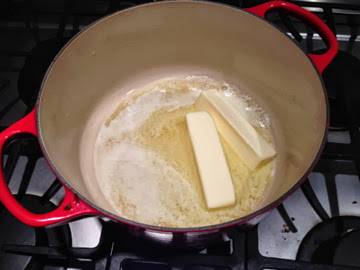
Once melted, add flour, and stir it into the butter until smooth.
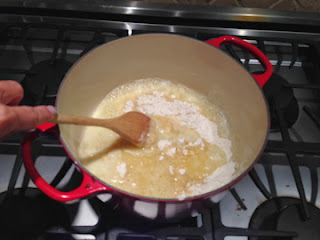
Cook the mixture together for a minute, stirring constantly. Pour in a small drizzle of your milk, whisking constantly into the butter-flour mixture until smooth. Continue to drizzle a very small amount at a time, whisking constantly.

Once you’ve added a little over half of your milk, you’ll find that you have more of a thick sauce or batter, and you can start adding the milk in larger amounts, being sure to keep mixing.
Once all of the milk is added, add the salt, garlic, nutmeg and few grinds of black pepper, and bring the mixture to a lower simmer, and cook it, stirring frequently, for 10 minutes.

Taste and adjust seasonings if needed.

At last, assemble your dish: Preheat oven to 400 degrees (unless preparing in advance, and you’ll refrigerate once the assembling is done). In a 9×13-inch rectangular baking dish, spread a generous 1/4 cup of the béchamel. Add your first layer of cooked noodles, patching them to form a layer.
Ladle 1 cup bolognese sauce over the noodles, spreading it evenly. Drizzle 1/2 cup béchamel over the bolognese; don’t worry about getting it perfectly smooth or even. Sprinkle the layer with 1/3 cup parmesan cheese.

Repeat this process — pasta + 1 cup bolognese + 1/2 cup béchamel + 1/3 cup parmesan — three more times, then add one more layer of pasta.

You’ll use 5 layers of pasta total. Sprinkle the top layer with your remaining parmesan before baking.
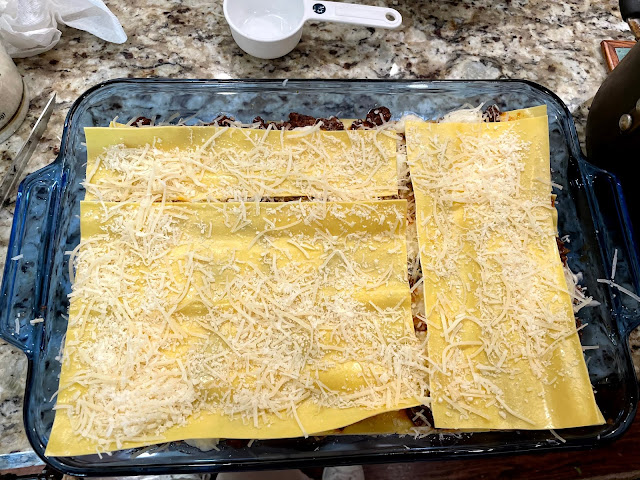
Bake your lasagna for 30 to 45 minutes, until bubbly all over and browned on top.

When it comes out of the oven, let it rest for 10 minutes before serving it. Do ahead: Lasagna can be prepared right up until the baking point a day in advance, and kept wrapped in plastic in the fridge
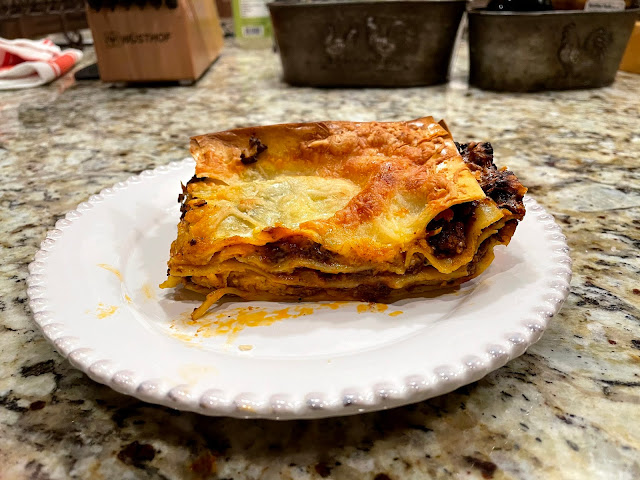
.
